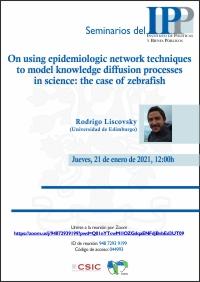Seminarios del IPP: "On using epidemiologic network techniques to model knowledge diffusion processes in science: the case of zebrafish”
Evento online a través de Zoom (Enlace https://zoom.us/j/94872939199?pwd=Q01nYTcwM1lOZGdqaENFdjBvbEd3UT09 - ID de reunión: 948 7293 9199 - Código de acceso: 044993)
Por Rodrigo Liscovsky (University of Edinburgh)
Abstract: Collaborative networks are a distinct feature of contemporary scientific practise and a major driver of knowledge diffusion across disciplinary and geographical borders. Scholars, however, have noted how the growth of collaborative research has not translated into a more equitable distribution of scientific competence, but rather to its concentration. Recently, this has led to the renewal of centre-periphery explanations and the emergence of competing models emphasising the relevance of global pipelines to access novel ideas on the one hand, and models stressing the importance of local networks in fostering innovative development in science on the other. Based on recent developments in network studies (Valente 2010), I developed a simple methodology to model diffusion process using epidemiologic network techniques and bibliometric data. In this presentation, I will discuss the application of this methodology to model the diffusion of zebrafish (a 1 and ½ inches long tropical freshwater fish) as a model organism in biomedical research. Model organism research in general and zebrafish in particular are interesting candidates for modelling for at least three reasons. First, collaborative networks based on the exchange of resources, including species and breeding techniques, constitute the pillar of the research ethos that surrounds model organism research and it is regarded as its most celebrated and distinctive feature. Second, the zebrafish (Danio rerio) has become one of the fastest-growing model organisms in terms of publications surpassing in some cases well-established model organisms such as Drosophila (fruit fly) and Xenopus (frog). Third, its growth has been especially unprecedented in peripheral regions like Latin America, where researchers have traditionally characterised by a lack of access to commercial holding systems and many of whom are self-taught in the art of fish husbandry. Overall, I intend to describe the diffusion of zebrafish from a network perspective and share some of my reflections on the use of these novel techniques in bibliometric research.
Bio:
Rodrigo Liscovsky is a PhD candidate in Science, Technology and Innovation Studies. He holds an MSc by Research (with Distinction) in the same area, an M.Phil. in International Peace Studies (with Distinction) from Trinity College Dublin (Ireland) and a B.A. in Political Science with a major in International Relations from the Universidad Complutense de Madrid (Spain).
Organiza: Francisco Herreros (IPP-CSIC)




